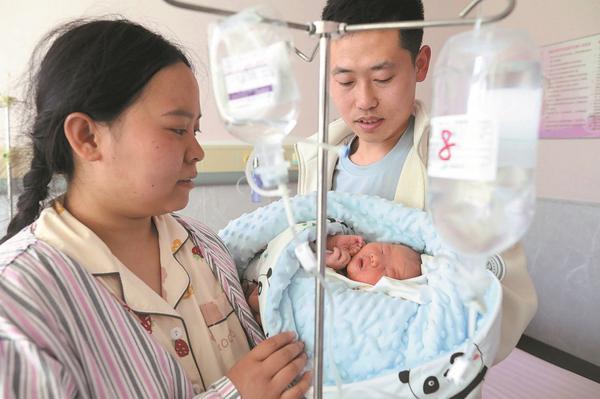
Han Yuanhui (left) and her husband Ren Jinliang take care of their newborn baby in the obstetrics and gynecology ward of Shanxi Provincial People's Hospital on March 29. (ZHU XINGXIN/CHINA DAILY)
China's total population dropped for a third consecutive year in 2024, but a slight increase in the number of newborns demonstrates the outcomes of a national push to build a birth-friendly society and highlights the need for more concrete measures to support fertility, according to experts.
The National Bureau of Statistics said on Friday that 9.54 million babies were born last year, up from 9.02 million in 2023. Previously, the annual number of newborns had fallen for seven straight years.
However, because 10.93 million people died last year, the nation's overall population dropped by 1.39 million to 1.408 billion. The decrease in the total population was 2.08 million in 2023 and 850,000 in 2022, data shows.
Yuan Xin, a professor at Nankai University's School of Economics, said that an increase in new marriage registrations for 2023, the auspicious zodiac sign of the Year of the Dragon in 2024, and the roll-out of a slew of birth-friendly measures contributed to the uptick in newborns.
"China has been stepping up efforts to build a policy system for supporting fertility since 2021, and has formed a basic policy framework. Naturally, these policies have yielded positive outcomes and resulted in the small increase," he said.
China announced in June 2021 that all couples would be allowed to have a third child, and in August that year it amended the Law on Population and Family Planning to incorporate related stipulations.
Over the past two years, the central leadership has stressed establishing and upgrading policy systems to build a birth-friendly society, Yuan noted.
"Fertility supportive policies, technologies and care and respect for fertility have improved and become more comprehensive," he said.
Lu Jiehua, a professor in Peking University's Department of Sociology, said that local governments have explored and rolled out a series of incentives, ranging from extending maternity leave to issuing fertility and childcare subsidies.
"The emphasis put on expanding nursery care services — with a goal of reaching 4.5 nursery care slots per 1,000 population by the end of 2025 — is particularly important because it helps address one of the prominent and practical concerns of families," he said.
However, experts described the increase as transient and said that, in the long term, the annual number of births is bound to fall.
"Because the number of women of childbearing age is shrinking, the number of babies born each year will be limited regardless of whether the fertility rate (the average number of babies born to a woman of reproductive age) rises or not," Yuan said.
Data released by the bureau on Friday also showed that the number of people age 60 or older reached 310 million in 2024, or 22 percent of the total population. The proportion of elderly had climbed from 18.1 percent in 2019 and 21.1 percent in 2023.


















































 京公網安備 11010202009201號
京公網安備 11010202009201號